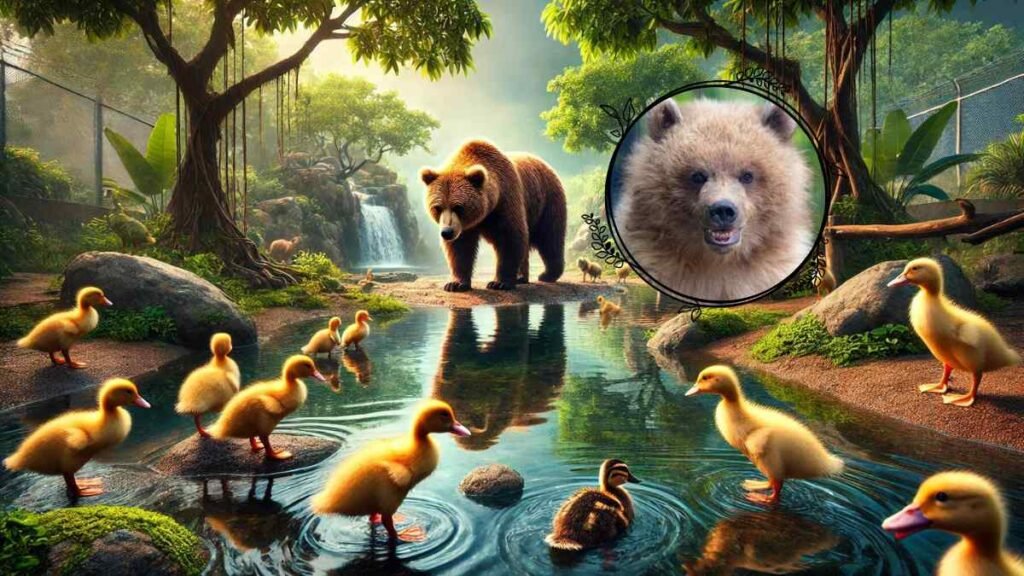The Woodland Park Zoo recently became the center of attention after an unexpected event in the bear enclosure, where a bear devoured several ducklings that wandered too close. This rare occurrence has sparked discussions about the unpredictable nature of wildlife, even within the controlled environment of a zoo. The incident serves as a stark reminder of the untamed instincts that reside in even the most familiar animals.
Introduction
The Woodland Park Zoo, a beloved destination for families and wildlife enthusiasts alike, recently found itself at the center of an unexpected and unsettling incident. On what began as a typical day, visitors witnessed a rare and shocking event: a bear in the zoo’s enclosure devouring a group of ducklings that had wandered too close to the predator. This encounter left many zoo-goers stunned and raised important questions about the nature of wildlife, even within the seemingly controlled environment of a zoo.
The Incident in Detail
The incident occurred in the early afternoon when a mother duck and her ducklings entered the bear enclosure, perhaps mistaking it for a safe haven. To the shock of onlookers, the bear’s predatory instincts quickly took over, leading to a swift and tragic end for the ducklings. Witnesses described the scene as both heartbreaking and awe-inspiring, a stark reminder of the raw power of nature. The headline “Woodland Park Zoo Bear Eats Ducklings” soon spread, capturing public attention and sparking discussions.
Understanding Animal Behavior
While such an incident may seem shocking, it is a reminder that even animals in captivity retain their wild instincts. Bears, like many other predators, are opportunistic feeders and will not hesitate to prey on smaller animals that enter their territory. Zoos strive to simulate natural environments for their animals, which sometimes results in the unexpected—where natural behaviors emerge in full force. The “Woodland Park Zoo Bear Eats Ducklings” incident underscores the delicate balance zoos must maintain between showcasing wildlife and ensuring the safety of all creatures involved.
Zoo’s Response and Public Reaction
In the wake of the incident, Woodland Park Zoo issued a statement expressing their regret over the event and reassuring the public that measures would be taken to prevent similar occurrences in the future. The incident sparked a range of reactions, from empathy for the ducklings to a deeper understanding of the bear’s instinctual behavior. Social media buzzed with discussions, with some expressing concern over the ethics of housing predators and prey in such close proximity, while others saw it as a natural, albeit unfortunate, event.
The Bigger Picture: Wildlife Interactions in Zoos
This incident is not isolated; similar occurrences have been reported in zoos around the world. These situations raise important ethical questions about the design and management of zoo enclosures. Should zoos take additional steps to prevent such interactions, or should they allow nature to take its course, even within the confines of a zoo? The debate touches on the educational value of zoos versus the responsibility to protect all animals within their care. The “Woodland Park Zoo Bear Eats Ducklings” story has become a case study in this ongoing discussion.
Lessons Learned and Future Precautions
As a result of this incident, Woodland Park Zoo is likely to review its enclosure designs and visitor protocols to enhance safety and awareness. Educating the public about the realities of wildlife, even in captivity, will be crucial in preventing future misunderstandings. By making adjustments to the enclosures and closely monitoring animal behavior, zoos can continue to provide a safe environment for both their animals and visitors.
Conclusion
The “Woodland Park Zoo Bear Eats Ducklings” incident serves as a powerful reminder of the inherent wildness that exists in all animals, even those living in zoos. While the event was tragic, it highlights the importance of respecting and understanding the natural behaviors of wildlife. As zoos continue to evolve, they must balance the need for education and conservation with the ethical responsibilities they hold towards the animals in their care. This incident will undoubtedly shape future policies and visitor experiences, ensuring that the unpredictable nature of wildlife is both respected and admired.
For More Visit, MirrorMagazine.co.uk


